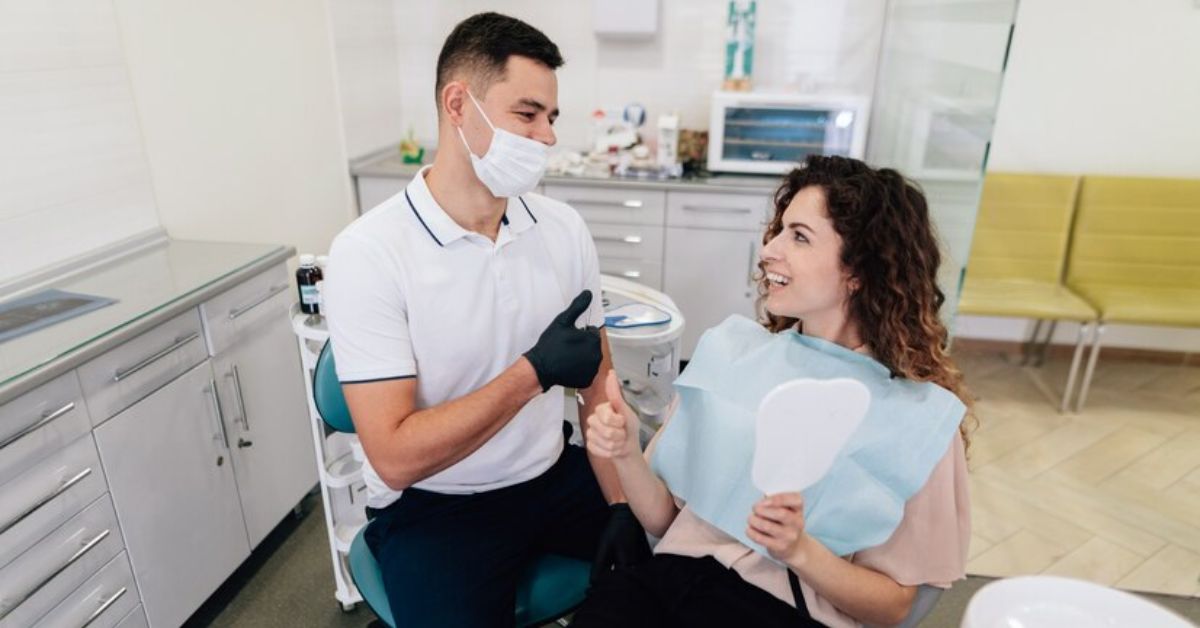HEALTH
Choosing the Right Dentist: What to Look for in Quality Dental Care

Finding the right dentist is a critical decision that impacts not only your oral health but also your overall wellbeing. With so many dental practices available, choosing a quality dentist can feel overwhelming. A great dentist should not only provide excellent care but also create a comfortable, supportive environment for patients.
This article will guide you through the essential factors to consider when choosing the right dentist to ensure you receive the best dental care possible.
1. Qualifications and Experience
The first step in choosing a dentist is verifying their qualifications and experience. Look for a dentist who has the necessary education, training, and certifications from accredited dental schools. In the U.S., dentists must hold a DDS (Doctor of Dental Surgery) or DMD (Doctor of Dental Medicine) degree and be licensed to practice in their state.
Additionally, it’s beneficial to choose a dentist with years of practical experience in the field. Experienced dentists are more likely to have handled a wide variety of cases, from routine cleanings to complex procedures, ensuring they can meet your needs.
Key points to consider:
- Verify the dentist’s credentials, including education and licenses.
- Look for experience, especially in specific areas of concern (e.g., cosmetic dentistry, orthodontics).
- Consider any additional certifications or specializations, such as periodontics or endodontics.
2. Range of Services Offered
A quality dental practice should offer a wide range of services, from routine cleanings and exams to more specialized treatments. This ensures that you can rely on one provider for all your dental care needs. If you’re looking for specific treatments, such as orthodontics, cosmetic dentistry, or dental implants, check whether the dentist is experienced in these areas.
Common services offered by dental practices include:
- Preventive care (cleanings, exams, X-rays)
- Restorative care (fillings, crowns, bridges)
- Cosmetic treatments (whitening, veneers, bonding)
- Orthodontics (braces, Invisalign)
- Emergency care (toothaches, injuries)
- Specialized treatments (root canals, gum disease therapy)
Choosing a dentist who offers comprehensive care can save you the hassle of being referred to specialists for different treatments, ensuring continuity and convenience in your care.
3. Reputation and Patient Reviews
One of the best ways to gauge the quality of a dentist is by checking their reputation in the community. Online reviews and testimonials can give you valuable insight into the experiences of other patients. Look for patterns in reviews, such as comments on the dentist’s bedside manner, office environment, and treatment outcomes.
In addition to online reviews, consider asking for personal recommendations from family, friends, or colleagues. People who have had positive experiences with a dentist are often happy to share their insights.
What to look for in reviews:
- Overall patient satisfaction
- Consistency in positive feedback
- Comments on the dentist’s communication skills and professionalism
- Specific praise for the quality of care provided
4. Comfortable Office Environment and Technology
A clean, welcoming office environment is an essential part of quality dental care. From the moment you walk into a dental office, you should feel comfortable and at ease. Pay attention to the cleanliness of the space, the professionalism of the staff, and the overall atmosphere.
Modern dental technology is another factor to consider. Dentists who use up-to-date technology can offer more accurate diagnoses, faster treatments, and improved comfort for patients. Digital X-rays, 3D imaging, laser dentistry, and CAD/CAM technology for same-day crowns are examples of innovations that can enhance your dental experience.
Consider these factors:
- Is the office clean, organized, and well-maintained?
- Does the dentist use advanced technology to improve patient care?
- Is the waiting area comfortable, with amenities like Wi-Fi, magazines, or beverages?
5. Communication and Patient Education
A great dentist should prioritize open communication and patient education. They should take the time to explain your treatment options, listen to your concerns, and answer any questions you have. Understanding your oral health and the treatments you need is crucial to making informed decisions about your care.
Additionally, look for a dentist who provides thorough consultations and detailed treatment plans. They should be transparent about the costs involved and any potential risks or benefits of a procedure.
Key communication aspects:
- Does the dentist explain procedures clearly and offer treatment options?
- Are they patient and willing to address your questions and concerns?
- Do they provide advice on how to maintain good oral hygiene between visits?
6. Accessibility and Location
The location of the dental office and the accessibility of services are important factors to consider when choosing a dentist. You’ll want to find a dental practice that is conveniently located near your home, work, or school to make appointments easier to manage.
Additionally, consider the office hours and how accommodating the practice is when it comes to scheduling appointments. Many patients prefer dental offices that offer evening or weekend hours, particularly if they have busy schedules during the week.
Accessibility factors to consider:
- Is the dental office located within a reasonable distance from your home or work?
- Do they offer flexible hours to accommodate your schedule?
- How easy is it to book appointments, and is the practice responsive to your needs?
7. Insurance and Payment Options
Before committing to a dentist, make sure the practice accepts your dental insurance or offers payment plans that fit your budget. Dental care can be expensive, so it’s essential to understand how costs are handled upfront.
Some dental offices offer financing options, such as payment plans or credit programs like CareCredit, to help patients manage the cost of more extensive treatments. If you don’t have insurance, inquire about the practice’s fees and whether they offer discounts for new patients or regular cleanings.
Key considerations:
- Does the dentist accept your dental insurance plan?
- Are there flexible payment options available for more extensive treatments?
- Does the practice offer upfront estimates or cost transparency?
8. Emergency Care Availability
Dental emergencies can happen unexpectedly, so it’s essential to choose a dentist like dentist Dr. Roland Pagniano who provides emergency care or has a plan in place for after-hours emergencies. Whether you experience a sudden toothache, chipped tooth, or injury, knowing you can rely on your dentist for prompt care can provide peace of mind.
Some practices offer same-day appointments for emergencies or after-hours contact options to handle urgent cases.
Important questions:
- Does the dental office provide emergency services?
- How can you reach the dentist after hours if you have an urgent issue?
Conclusion: Making an Informed Choice for Your Dental Health
Choosing the right dentist is an important decision that can greatly impact your oral health and overall wellbeing. By considering factors like qualifications, services offered, patient reviews, office environment, and communication, you can find a dentist who meets your needs and provides quality care.
Ultimately, the right dentist should make you feel confident and comfortable in maintaining your oral health, offering both expertise and a welcoming environment that fosters trust. Whether you’re looking for preventive care or specialized treatments, a well-chosen dentist can help you achieve a healthy, beautiful smile for years to come.
HEALTH
Tracing Your Roots: Understanding Genetic Heritage Through Ancestry DNA

Tracing our roots has always been a fascination for many people. The idea of uncovering the stories of our ancestors has become more accessible in recent years with the advent of ancestry DNA testing. This scientific tool has the potential to unlock a world of information about our genetic heritage and cultural background. Below, we will explore how ancestry DNA works, its importance in uncovering your family history, and the insights it provides about your origins.
Exploring Your Genetic Legacy
DNA testing allows individuals to explore their genetic makeup and uncover previously hidden connections. By comparing your genetic data with databases from different populations, you can begin to piece together your ancestral story. The results often reveal unexpected connections to distant regions, providing a deeper understanding of who you are and where your ancestors came from.
One of the most significant aspects of genetic testing is identifying genetic markers specific to particular groups. These markers are inherited over generations and remain relatively unchanged, offering a detailed map of your genetic past. Many people find that they share genetic traits with groups from parts of the world they had no idea were part of their family’s history.
The best DNA upload sites help people gain access to broader databases and build connections with distant relatives. These platforms allow individuals to share their genetic information and discover previously unknown family connections. The global nature of these databases means that a simple DNA test can open up many possibilities for expanding your family tree.
Understanding your genetic heritage also has medical implications. Genetic testing can uncover predispositions to certain health conditions and provide valuable information for making informed decisions about your health. This aspect of DNA testing adds another layer of significance to exploring your genetic legacy.
Unlocking the Secrets of Your Family Tree
The journey of uncovering your family tree can be a deeply personal experience. Ancestry DNA tests can link you to specific regions and ethnic groups that have influenced your family’s history. These findings often spark curiosity about how past generations shaped who you are today.
One of the remarkable aspects of family tree research is the ability to trace direct connections to distant relatives. Many people have experienced the thrill of discovering relatives they never knew existed through shared genetic markers. This sense of connection to others is a powerful reminder that the stories of our ancestors are still woven into the fabric of our lives.
Ancestry DNA testing can also provide clarity on family myths or mysteries. Stories of distant relatives or legendary figures in the family often take on a new meaning when supported by genetic evidence. Whether confirming or disproving family lore, DNA testing can be a valuable tool for understanding the truth behind these tales.
Genealogy enthusiasts often use DNA results in combination with traditional research methods to unlock further details about their family tree. While DNA offers an exciting new perspective, historical records, documents, and other genealogical resources remain essential in constructing a full picture of family history.
How Ancestry DNA Reveals Your Origins
Ancestry DNA tests have the ability to trace the migration patterns of your ancestors over thousands of years. By analyzing specific markers within your DNA, scientists can determine which regions your ancestors likely lived in and how they moved across the globe. This historical perspective connects your genetic information to the broader story of human migration.
The results of an ancestry DNA test are often broken down into percentages, each representing different geographic regions. These percentages reflect the ancestral contributions from various populations over generations. Over time, as more people test their DNA, the accuracy of these results improves, offering increasingly precise insights into your origins.
Your DNA can also reveal connections to ancient civilizations and populations that no longer exist. This information can be both fascinating and humbling as it places you within the context of human history. Whether your DNA links you to early European settlers, indigenous populations, or ancient African tribes, these results serve as a powerful reminder of the interconnectedness of all people.
The ability to connect with distant cousins and relatives through shared genetic markers is one of the most exciting aspects of ancestry DNA. These connections can lead to meaningful relationships and shared research that enhances your understanding of your origins. The discovery of new family members often enriches the experience of learning about your genetic history and deepens your sense of belonging.
Overall, ancestry DNA testing offers profound insights into our genetic heritage, revealing connections to distant regions and relatives that were once hidden. It is a powerful tool for understanding our origins, enhancing our sense of identity and belonging while connecting us to the broader human story.
HEALTH
What Is Hospital Indemnity Reliance: Benefits & Coverage

Introduction
Unexpected hospital stays can be financially draining, even with traditional health insurance. This is where hospital indemnity insurance comes in. But what is hospital indemnity reliance, and how can it provide an extra layer of financial security? This comprehensive guide will explore everything you need to know about hospital indemnity reliance, its benefits, coverage details, and how to determine if it’s the right choice for you.
What Is Hospital Indemnity Reliance?
Hospital indemnity reliance refers to a type of insurance policy that provides fixed cash benefits for hospital stays due to illness, injury, or surgery. Unlike traditional health insurance, which covers medical bills, hospital indemnity insurance pays you directly, allowing you to use the funds as needed—whether for medical expenses, lost wages, or personal costs.
How Does Hospital Indemnity Insurance Work?
When you’re hospitalized, a hospital indemnity plan provides a predetermined payout based on your policy. This can include:
- Daily cash benefits for each day of hospitalization.
- Lump sum payments for intensive care unit (ICU) stays.
- Additional payouts for surgical procedures and emergency room visits.
Key Benefits of Hospital Indemnity Reliance
1. Financial Security
Hospital stays come with multiple expenses beyond medical bills, such as transportation, childcare, and lost income. The cash payout helps cover these costs without dipping into savings.
2. Flexibility in Usage
Unlike traditional health insurance, indemnity payments go directly to you. You can use them for:
- Deductibles and copayments
- Rent or mortgage payments
- Daily expenses (groceries, utilities, etc.)
3. No Network Restrictions
Hospital indemnity insurance is independent of healthcare provider networks. You can seek treatment from any hospital without worrying about in-network or out-of-network coverage limitations.
4. Affordable Premiums
Compared to comprehensive health plans, hospital indemnity insurance is often more affordable, making it an excellent supplement for those on a budget.
5. Additional Coverage for Critical Care
Many policies offer enhanced benefits for ICU stays, surgeries, and extended hospital stays, ensuring greater financial protection.
What Does Hospital Indemnity Insurance Cover?
Hospital indemnity policies vary, but common coverage includes:
- Daily hospital stays (fixed amount per day)
- ICU admission (higher payout for intensive care)
- Surgical procedures (one-time payment for covered surgeries)
- Emergency room visits (coverage for urgent medical needs)
- Ambulance services (transportation costs included in some policies)
Who Should Consider Hospital Indemnity Insurance?
1. Individuals with High-Deductible Health Plans (HDHPs)
If your primary insurance has high out-of-pocket costs, hospital indemnity insurance can provide financial relief.
2. Self-Employed Individuals & Gig Workers
Those without employer-sponsored benefits can use indemnity coverage to offset income loss during hospital stays.
3. Families & Caregivers
Parents and caregivers can benefit from the added financial security, ensuring they can focus on recovery without financial stress.
4. Seniors & Medicare Beneficiaries
Medicare alone doesn’t cover all hospitalization costs. Indemnity insurance helps bridge the financial gap for seniors.
Comparing Hospital Indemnity Insurance vs. Traditional Health Insurance
| Feature | Hospital Indemnity Insurance | Traditional Health Insurance |
|---|---|---|
| Payout | Fixed cash payments | Pays for medical expenses |
| Usage | Flexible (can be used for non-medical costs) | Restricted to covered medical bills |
| Provider Network | No network restrictions | In-network & out-of-network rules apply |
| Premiums | Generally lower | Higher, especially for comprehensive plans |
| Best For | Supplemental financial support | Comprehensive medical coverage |
How to Choose the Right Hospital Indemnity Plan
When selecting a policy, consider the following factors:
- Coverage limits & payout amounts – Ensure the policy provides adequate benefits.
- Premium costs – Balance affordability with coverage needs.
- Exclusions & waiting periods – Check for conditions not covered.
- Additional benefits – Look for add-ons like ICU and surgical benefits.
Final Thoughts
Hospital indemnity insurance offers a financial safety net for unexpected hospital stays, ensuring you have extra cash to manage expenses beyond medical bills. Whether you’re looking to supplement an HDHP, secure financial stability as a freelancer, or support a loved one’s care, this coverage can be a wise investment.
FAQs
1. Is hospital indemnity insurance worth it?
If you want extra financial security for unexpected hospital stays, hospital indemnity insurance is a valuable supplement.
2. Does it cover pre-existing conditions?
Most policies have a waiting period before covering pre-existing conditions. Always review the policy details before enrolling.
3. Can I use hospital indemnity payments for non-medical expenses?
Yes! Unlike traditional insurance, indemnity payouts go directly to you, and you can use them for any purpose.
4. How do I file a claim?
Filing a claim typically involves:
- Submitting proof of hospitalization (discharge papers, medical reports)
- Completing claim forms
- Providing necessary documentation to the insurer
HEALTH
Fitness Tips Specifically for Men’s Health: What Works Best

Introduction
Men often prioritize career and family over their well-being, leading to neglect of fitness and health. Committing to a planned fitness routine enhances physical health and improves mental clarity and emotional stability. Collaborating with experienced professionals, such as those at a reputable men’s health clinic, can provide individualized guidance and support, ensuring that fitness regimens offer maximum benefit. This focus on tailored approaches helps men achieve specific health goals while avoiding common pitfalls.
Importance of Customized Fitness for Men
Each man’s body is unique, and a one-size-fits-all approach often fails to address individual needs. Tailoring workouts to align with personal goals ensures effectiveness and reduces injury risk. Fitness plans can be adjusted to accommodate various factors such as age, existing health conditions, and lifestyle. Whether seeking to build muscle, lose weight, or enhance endurance, understanding what works best for each person is critical. Considerations around metabolic rates and hormonal differences guide these personalized plans, promoting efficient progress and improvements in overall health.
Incorporating Strength Training
Strength training is a cornerstone of any fitness regimen to improve men’s health. It helps build muscle mass, enhance bone density, and increase metabolic rates. Compound squats, deadlifts, and bench presses can offer comprehensive benefits. These exercises simultaneously target multiple muscle groups, promoting efficiency and robust results. Not only do they improve physical appearance, but they also contribute to better practical strength and daily function. Guided programs at facilities like a Salt Lake City men’s clinic can help tailor these routines safely and effectively.
Cardiovascular Benefits
Cardiovascular health is crucial for men, impacting daily energy levels to long-term disease prevention. Regular aerobic activities such as running, swimming, or cycling strengthen the heart and boost circulation. This enhances endurance and reduces risks associated with heart disease, high blood pressure, and obesity. Consistent cardio workouts can be adapted to any fitness level, offering flexible, accessible opportunities for all men to improve their health. Many plans suggest mixing steady-state cardio with high-intensity interval training (HIIT) for optimal results, giving the body both sustained and explosive work periods.
The Role of Flexibility and Balance
Often overlooked, flexibility and balance are integral to a holistic fitness plan. Stretching exercises like yoga or dynamic stretching sessions improve joint health and range of motion, which is essential as the body ages. They prevent injury by preparing muscles for rigorous activity and aid in recovery post-workout. Integrating routines that enhance balance, such as tai chi or pilates, can further assist in maintaining coordination and stability, leading to safer, more effective exercise sessions.
Complementing Exercise with Nutrition
An effective fitness plan is incomplete without a focus on nutrition. A balanced diet rich in proteins, healthy fats, and carbohydrates fuels the body for exercise while promoting recovery and muscle growth. Nutrient timing—considering what to eat before and after workouts—can significantly influence performance and recuperation. Health clinic professionals and nutritionists provide insights to ensure dietary plans align with individual fitness goals, maximizing the efficiency and effectiveness of exercise regimes.
Maintaining Mental Health
Physical exercise directly correlates with improved mental health, serving as a powerful tool against stress, anxiety, and depression. Activities that increase heart rate also release endorphins, the body’s natural mood lifters. Incorporating activities like meditation, deep breathing, or mindfulness practices into fitness routines gives mental clarity and emotional resilience a noticeable boost. Prioritizing mental health enhances workouts and ensures a lifestyle balance that supports overall well-being.
Long-term Fitness Sustainability
Consistency is key to seeing continued improvements. Establishing a fitness routine seamlessly fits into daily life encourages continued participation and progress. Setting realistic goals, tracking achievements, and acknowledging milestones help maintain focus and motivation. Support systems such as community groups or fitness clubs can also provide essential encouragement and accountability. Personalized guidance from resources like health clinics ensures plans remain dynamic and adaptable, reflecting changes in health or fitness levels.
Conclusion
Fitness is a journey tailored to individual needs and circumstances. Men can significantly enhance their health and vitality by focusing on personalized approaches and incorporating strength, cardio, and flexibility exercises. Complementary nutrition and mental health support the physical gains, creating a holistic wellness plan. Long-term commitment to these practices encourages healthy aging and enriches the quality of life. Whether through self-guided routines or professional input, maintaining an adaptable, sustainable fitness plan enriches life at every stage.

 Cartoon1 year ago
Cartoon1 year agoUnlocking the Potential of Nekopoi.care: A Comprehensive Guide

 Game1 year ago
Game1 year agoExploring Aopickleballthietke.com: Your Ultimate Pickleball Destination

 BUSINESS1 year ago
BUSINESS1 year agoWhat Companies Are In The Consumer Services Field

 BUSINESS11 months ago
BUSINESS11 months agoUnraveling the Mystery of 405 Howard Street San Francisco charge on Credit Card

 HOME IMPROVEMENT1 year ago
HOME IMPROVEMENT1 year agoVtrahe vs. Other Platforms: Which One Reigns Supreme?

 TECHNOLOGY11 months ago
TECHNOLOGY11 months agoThe Guide to Using Anon Vault for Secure Data Storage

 ENTERTAINMENT8 months ago
ENTERTAINMENT8 months agoUnderstanding Bunkr Album: A Comprehensive Guide

 ENTERTAINMENT1 year ago
ENTERTAINMENT1 year agoThe Epic Return: Revenge of the Iron-Blooded Sword Hound
















